Our Stories / How the Design Community is Supporting COVID-19 Relief
Businesses across every industry in the world are giving charitably and finding other creative ways to provide relief from the far-reaching effects of the COVID-19 pandemic.
Among those businesses are those in the design community, uniquely positioned to offer something more – the creative power of design.
This week, we take you on a tour of some of the creative things the design community is doing to provide COVID-19 relief to those in need.
>Supply Creation and Donation
Many companies in contract furnishings and textiles are well-positioned to generate and donate “personal protective equipment” (PPE) for local healthcare providers and first responders. Dauphin, HBF & HBF Textiles, Landscape Forms, Steelcase and Herman Miller are just a few brands on this rapidly-growing list; we love the fun protective, washable mask designs from Stylex!
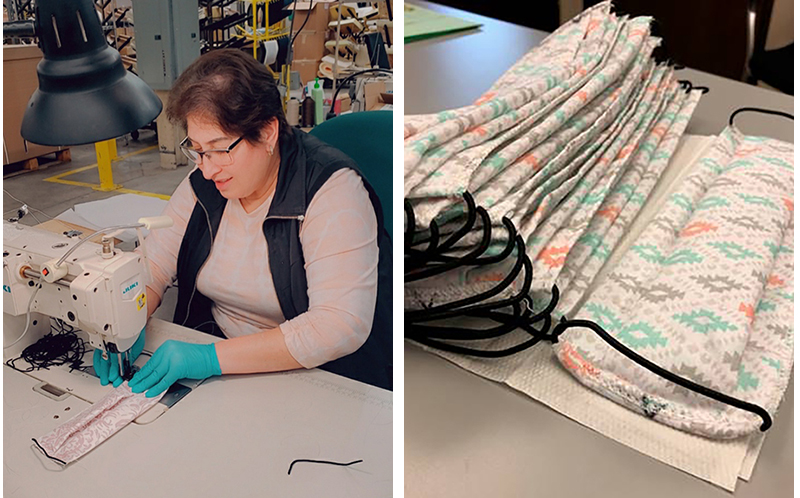
“A handful of the company’s skilled seamstresses and craftspeople are making the masks, which will be donated to local hospitals as long as there is a need,” reads the Stylex announcement. “Stylex Co-CEO Bruce Golden has been leading the charge, setting up deliveries and personally bringing masks to hospitals and other healthcare facilities. ‘The unifying power of design has never been more important,’ said Golden. ‘We are honored to serve our community in this time of crisis, and put our amazing artisans to work on this task is a labor of love and solidarity.’”
In addition to donating its inventory of PPE, “including respiratory masks and gloves, to healthcare authorities, Landscape Forms is partnering with peer companies to produce clear protective face shields for use by those on the front lines of care,” notes a company announcement. “The company is also providing leadership to identify government support opportunities and assistance measures for our community and its businesses.”
The big guys are, of course, also taking part.
Herman Miller has been manufacturing 1,500 face masks per day for both their own team members and outside healthcare partners, working directly with local hospitals to design and engineer masks for use at the hospitals and their partner facilities.
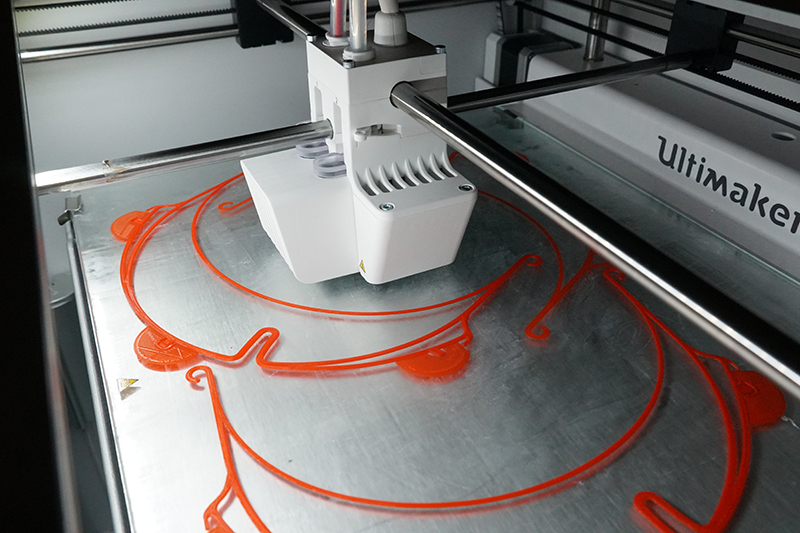
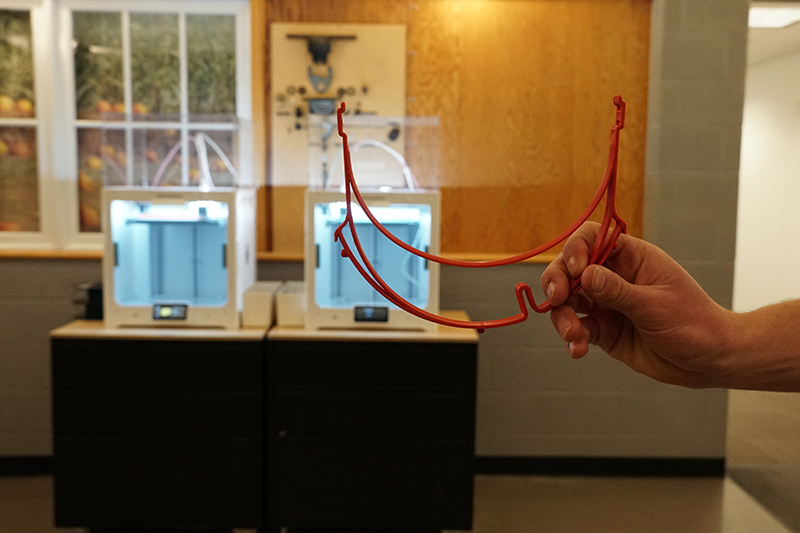
“During the design process, engineers at Herman Miller used 3D printing to create a fixture that, when mounted on a sewing machine, folds and holds in place the pleats for face masks, reducing the amount of time it takes to make them. We shared the design online with a global audience. Now both companies and individuals around the world are utilizing the fixture to maximize the number of masks they can make for their local communities’ frontline healthcare providers.”
The company’s philanthropic arm, Herman Miller Cares, is enabling them to work with local communities to address specific needs, such as:
>West Michigan: Herman Miller Cares has invested over $100,000 in West Michigan programs helping to ease the stress on local resources caused to COVID-19. These include the Emergency Human Needs Fund at the Holland/Zeeland Community Foundation, Hand2Hand, and Kids Food Basket.
>China: In Dongguan, our Asia-Pacific team is supporting Chuang Yi, an international charity that serves weak and disabled people in their communities. Our support will go toward distributing vital face masks to vulnerable individuals in their community.
>United Kingdom: In Melksham, our Europe, Middle East, and Africa team is supporting the Trussell Trust Food Bank, a nationwide network of foodbanks that provides emergency food and help to people in vulnerable circumstances. The team has also dedicated funds to create visors with the 3-D printers at our Portal Mill facility. They now have enough material to make approximately 100 visors per day, which they will donate to the local Royal United Hospital.
>Mexico: In Mexico City, our Latin America and Caribbean team is supporting Sociedad Mexicana, an international charity providing continual medical education for respiratory healthcare workers. Our support will help provide diagnostic tests, laboratory equipment, and supplies for COVID-19 tests, as well as urgently needed PPE for healthcare workers.
On the manufacturing side, Herman Miller is prioritizing existing orders, “focusing on geographic location and concentrating on the hardest hit areas. As hospitals and healthcare facilities are facing the surge of patients, it is critical to get them the products the need for these spaces to be fully functional.” Those efforts include:
>A Houston area medical facility is renovating a tower and is needing to open a floors sooner than anticipated – our team has worked to fulfill the need for nurse stations to get this renovation open.
>In North Carolina, a health facility is building a tower specifically to combat COVID 19 with containment and recovery efforts. We’ve processed orders and are expediting to get this done earlier than originally planned.
>Another organization with facilities in North Carolina and the Pacific North West is receiving medical tables to set up temporary lab spaces.
>A Pennsylvania facility was in desperate need of Overbed Tables and Patient Recliners and our team was able to turn this order around in just one week to help support the increased capacity.
From Steelcase comes a wealth of support, in both design power and resource support. Collaborating with community partners, the company is designing and manufacturing face masks and face shields, clear plexiglass barriers, and separation screens, and distributing them to hard hit areas like New York and Michigan.
For a peek into the COVID-inspired design world at Steelcase, check out its Steelcase 360 feature documenting the process.
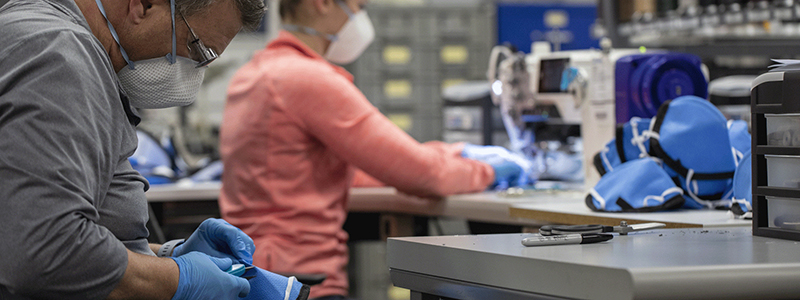
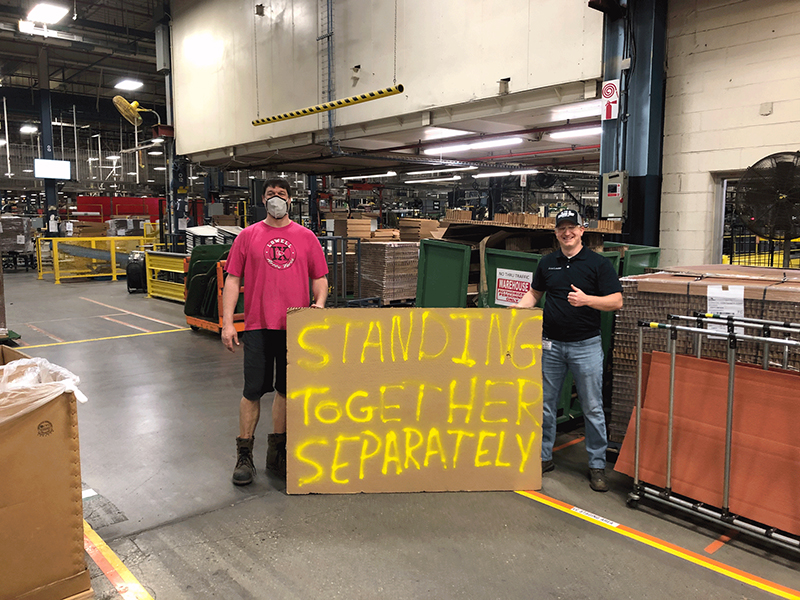 >A modular walk-in booth design for Coronavirus testing, by CannonDesign
>A modular walk-in booth design for Coronavirus testing, by CannonDesign
Geographically, those in urban areas are being hit the hardest, simply due to the sheer numbers of people living so close together. In response to a critical need for testing in these urban city centers, Chicago-based CannonDesign architect Albert Rhee has designed a walk-in testing booth for those without vehicles. From CannonDesign:
“Coronavirus testing operations are often the first physical point-of-contact between a healthcare provider and patient, bringing with it an inherent risk of transmission. Large drive-thru testing operations have proven effective in limiting provider-patient exposure and accelerating test administration here in the United States. But this form of testing requires significant PPE supplies for testing center staff and administrators. It also presents accessibility challenges for communities where large segments of the population don’t have access to a vehicle.”
“A walk-in testing booth provides an alternative solution that eliminates physical provider-patient exposure in a modular format that is simple to deploy for temporary testing operations. The design is based on testing operations already in place at Yang Ji General Hospital in Seoul, South Korea (featured in this YouTube video). Similar solutions have emerged throughout the world, but design development and production seem to be limited to single-user, single-site applications.”
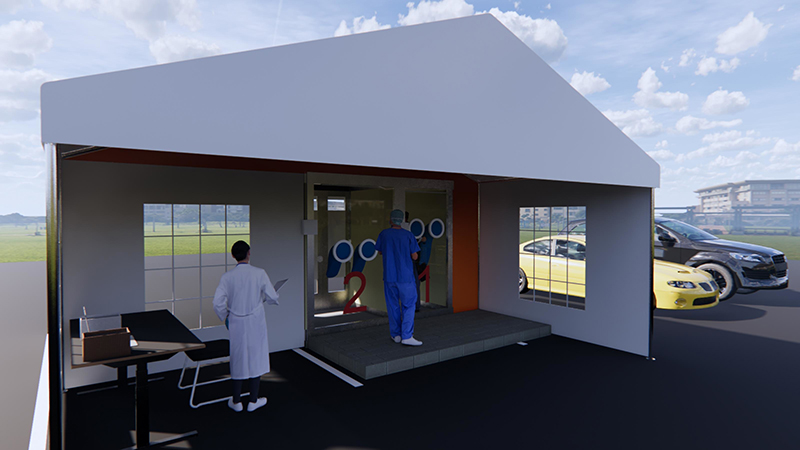
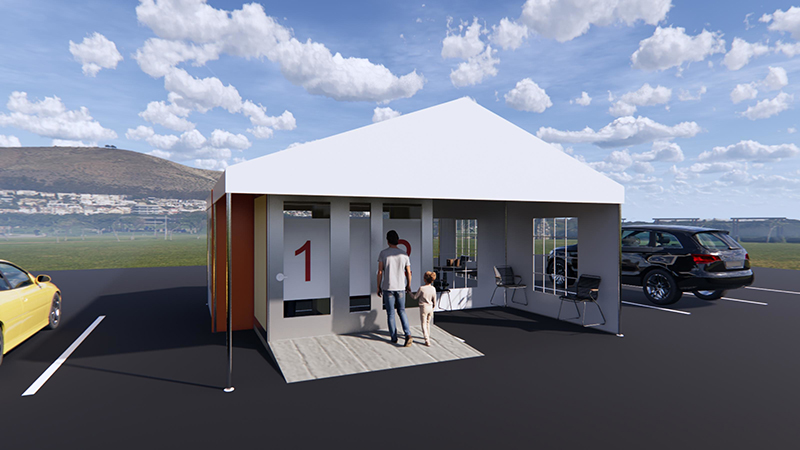 “We developed a drawing set for the modular system to establish a universal basis of design for broad-scale production and implementation of these walk-in testing booths. The booth system can be deployed on virtually any flat, outdoor surface and be powered by a single household electrical outlet. The dual-booth system is designed to accommodate alternating patient flow. While one booth is occupied by a patient, the adjacent booth can undergo a 10-minute disinfection process in preparation for the next patient.”
“We developed a drawing set for the modular system to establish a universal basis of design for broad-scale production and implementation of these walk-in testing booths. The booth system can be deployed on virtually any flat, outdoor surface and be powered by a single household electrical outlet. The dual-booth system is designed to accommodate alternating patient flow. While one booth is occupied by a patient, the adjacent booth can undergo a 10-minute disinfection process in preparation for the next patient.”
“Albert Rhee, AIA, LEED AP, is a healthcare architect and husband to a Chicago-based nurse. He is witnessing firsthand the enormous pressure caregivers are experiencing as they work to protect our communities while caring for COVID-19 patients.”
“‘This is a challenge that is very personal to me,’ explained Rhee. ‘Healthcare workers are extremely concerned about their personal safety and the safety of their families. The current strain on PPE supplies adds enormous stress on an already difficult situation.’”
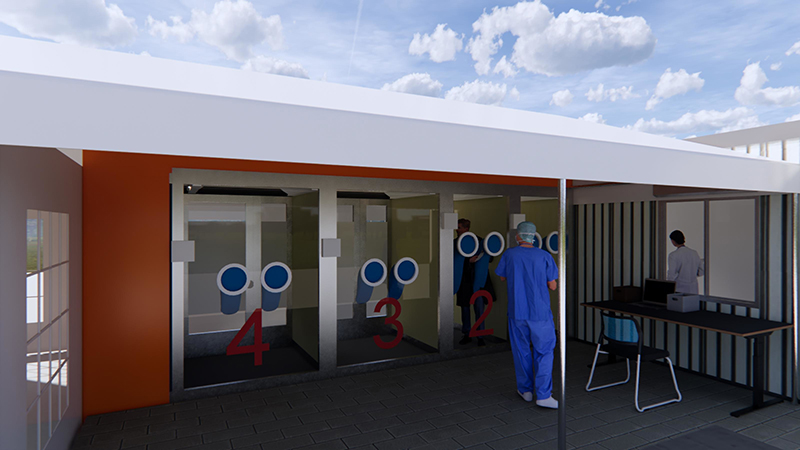
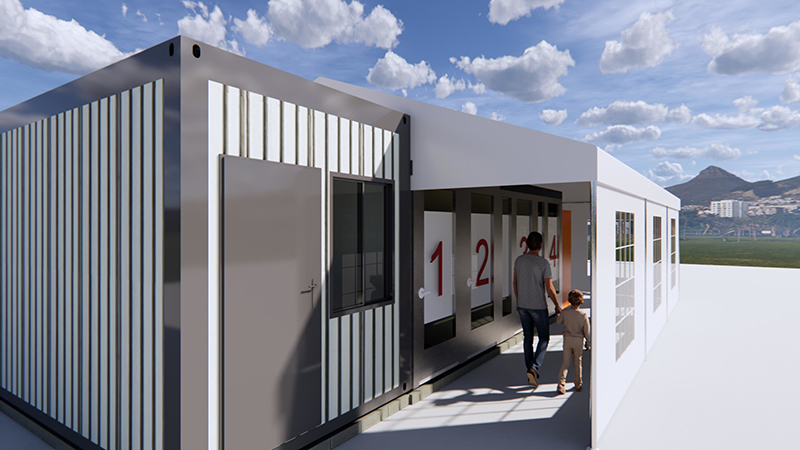
“Albert began to search for a design solution that might eliminate provider-patient exposure completely, thus reducing the consumption of PPE supplies. He also wanted to find something that could be effective in his own Chicago neighborhood. While monitoring recent COVID-19 developments in his hometown of Seoul, South Korea, he came across a local news segment exploring Yang Ji General Hospital’s novel solution for public testing: a telephone booth-inspired testing enclosure. The interview detailed how nearby hospitals expressed interest in the system, only to learn that the staff at Yang Ji General Hospital had constructed their booths without drawings or detailed plans. Albert drew upon his own experience to develop a drawing set adapted from what he observed in the video.”
“The resulting design documents are a collaboration between Albert and Buffalo-based mechanical engineer, Raymond Shultz, PE. Together, they hope that sharing these drawings will help to advance and accelerate the deployment of these modular systems in cities across the globe.”
>The MakingRoom program from the Center for Health Design
In response to the hospital bed shortage healthcare providers are struggling with, The Center for Health Design has created a website “to provide hospitals and other care providers with a forum to communicate their space needs; and for hotels to indicate their capacity and willingness to consider these urgent needs.”
The program, called “MakingRoom”, connects hotels and hospitals with urgent needs for space.
From the CfHD, “Right now, all around the country, there is an urgent need for safe, clean and immediately available accommodations that can be used as-is or adapted to provide much needed capacity for a variety of hospital needs.”
“This website has been created to provide hospitals and other care providers with a forum to communicate their space needs; and for hotels and others with multi-unit or high-occupancy residential facilities to indicate their capacity and willingness to consider these urgent needs.”
Healthcare providers and hospitality owners can complete an online form to post a space need or space availability in the Center’s online open-access database.
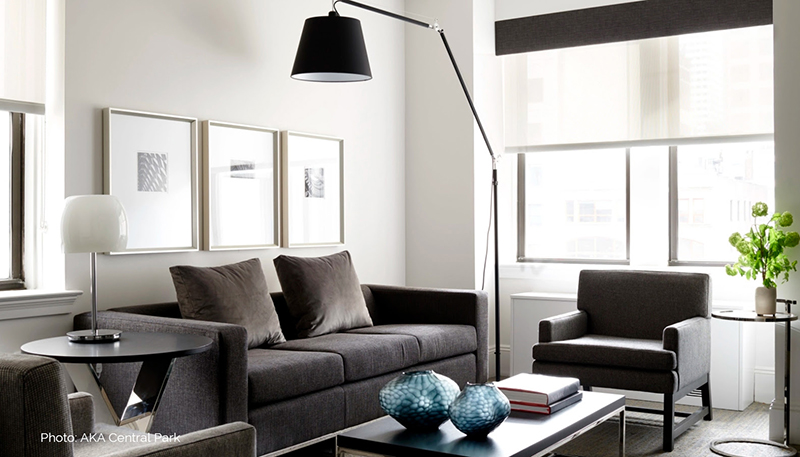
>Complimentary access galore – to keep our brains in shape and our curiosities buzzing
While we’re all working hard to maintain some semblance of our normal work routines, many of us are also trying to use quarantine and social distancing as a time to learn something new. In addition to the work- and team-oriented happy hours and team-building sessions, design firms and contract furnishings companies are launching webinar sessions (many of them complimentary) on every topic under the sun. Work-from-home related content is a dime-a-dozen, but many companies are using this online forum to help connect clients with their designers and design processes, product design ethos, and the technical side of what they do every day. For example, we just tuned into a Haworth webinar discussion with Patricia Urquiola, discussing her work and what designing in a virtual world has been like so far for her and her team.
The list of participating companies is long, but start by checking out those from Andreu World, Greenbuild, Herman Miller, IA Interior Architects, Parsons’ Healthy Materials Lab, Knoll and Steelcase. Some firms/companies have a regular weekly schedule, while others offer sessions more sporadically. A great way to stay in the know on upcoming webinars is to subscribe to the firm/company’s email communications.
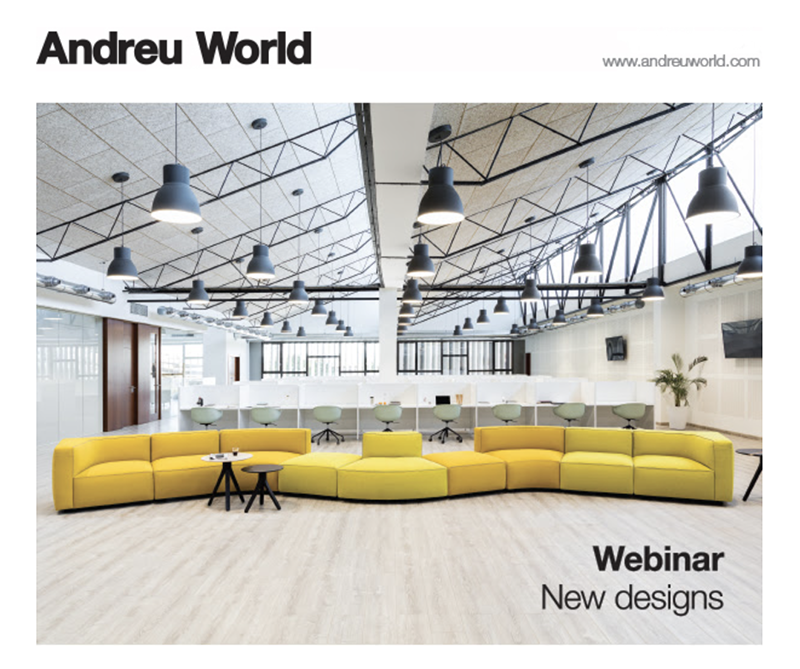


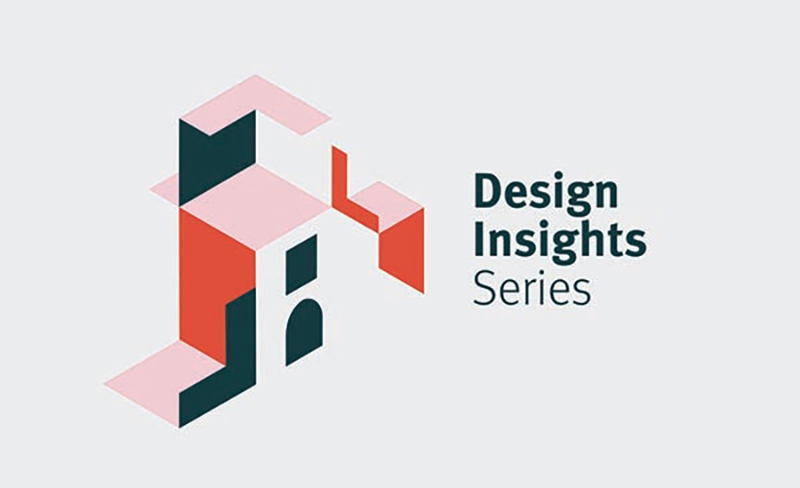
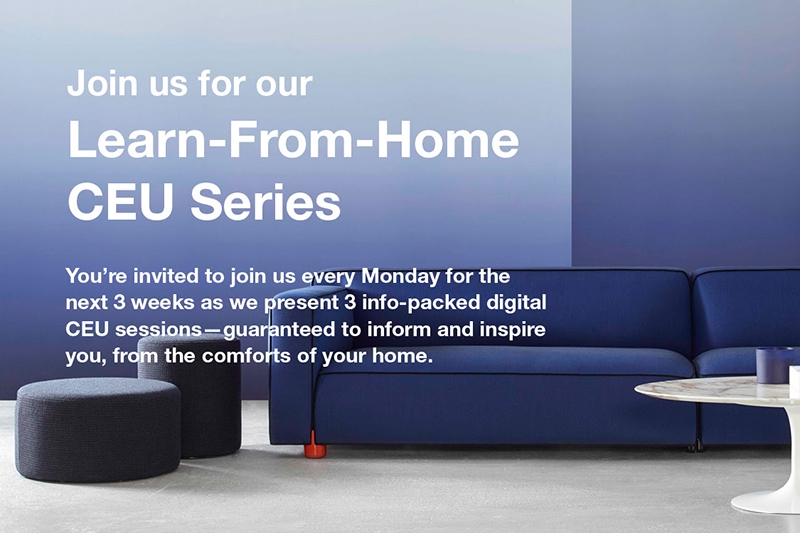 >Delos’ Facilities Improvement Program for Senior Living
>Delos’ Facilities Improvement Program for Senior Living
From day one, our elderly citizens and the nursing and support staffs who take care of them have suffered tremendously from the COVID-19 pandemic. Some organizations are in the perfect position to help ease the crippling effects of the virus. Delos is one of them.
“In response to the pandemic’s effect in aging communities, Delos, a pioneer of wellness real estate and founder of the Well Building Standard, will provide Air Purification Units, UVC technology, and protocol for cleaning, on-going filtration/maintenance parts, access to Cleveland Clinic programming, and access to the Delos™ Well-being Digital Library with all capital provided for rapid installation.”
>A home/office workout app by Wilkhahn
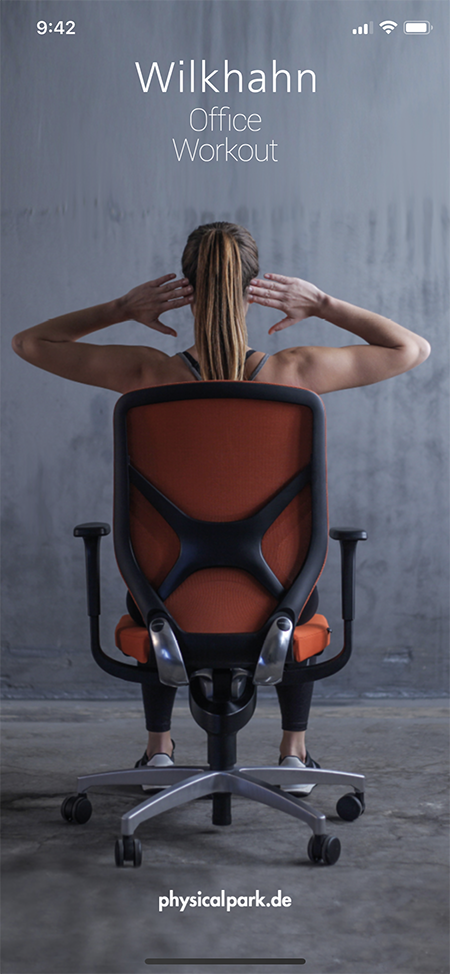
Online and app-based workout program interest is sky-rocketing for obvious reasons, and the contract furnishings industry is taking part, too.
Wlkhahn, the German manufacturer of ergonomic task chairs and conference tables, has created an app to help people stay active as they quarantine, hanging out in home offices.
The Home OfficeWorkout App by Wilkhahn encourages users to complete simple exercises using the desk chair they sit in every day.
“Wilkhahn developed this training app with the health professionals from physicalpark, to promote movement and also complement the other features that make up a healthy workplace whether it’s at home or in the office. Getting not only the body, but also the mind moving, is extremely important; small changes can have a significant effect.”
The Home OfficeWorkout App is available free of charge in the Apple App Store and Google Play Store (search term: Wilkhahn).



